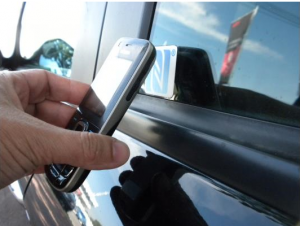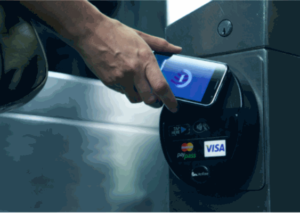NFC, or Near Field Communication, is a technology that is still new and will become widespread on all mobile devices in the years to come. It can be said without too much risk to be mistaken that the NFC will eventually be implemented by default on all our smartphones, tablets, and audio-video players connected, as well as Bluetooth or WiFi for example. The Bluetooth Audio Transmitter is usually used to transmit and support that device which doesn’t have any Bluetooth functionality for more details visit.
The NFC makes it possible to establish a communication between 2 compatible devices at a short distance (10 cm maximum). It uses for this a technique based on short waves. The principle is not unlike the one used for our Navigo cards in Parisian transport, although the technology used is different. The possible applications are many, I suggest you look at some of them particularly interesting:

1 – Forget bank card, car key, ticket, loyalty card, you can use your smartphone as a means of transport, payment at checkout, registration or use of your loyalty points when shopping in your favorite brand.
All information will then be stored on the SIM card of your phone. The fact that the NFC involves a very short distance for its use provides security, without counting, of course, the encoding and encryption of data. Moreover, all the studies show that one notes much faster the loss or the forgetfulness of his smartphone than a card in his wallet. The vast majority of mid-range and high-end smartphones today benefit from an NFC chip, and entry-level models also enter the dance.
2 – A bit like the Flash code but more simply and with a scope much wider, NFC will allow, bringing mobile-compatible linear access to information on products which interest you. Traceability of a food product, ecological footprint on a toy, consumer reviews on a Blu-Ray player, competitive prices for a computer, applications seem virtually endless. In the same way, we can know the actual waiting time for the next bus in an equipped bus shelter, or get information about the artist during an exhibition. It will be understood, the NFC will consecrate the era of the
3 – In a field which concerns us more particularly here, the NFC makes it possible to communicate 2 compatible devices, for example, to connect a nomadic reader and a wireless speaker, without any configuration, unlike Bluetooth which requires that the 2 devices be to recognize and connect (we are talking about pairing). The NFC allows them to exchange information, URLs, links, etc. However, the transfer of multimedia content or files is not possible for reasons including low speed.
4 – After-sales service and technical assistance for NFC devices will be greatly simplified. Let me explain, no need to go out of Polytechnic to explain a technical problem to your troubleshooter on the phone, you bring the NFC smartphone closer to the NFC device, it collects the information, and it is only necessary to send them to the technician, for a saving of time and efficiency. And why not, in the other direction, consider receiving technician reprogramming information from your device that you enter through the NFC? A real dream, instant and remote repair!

The uses we have just seen, and which are only a sample of the possibilities offered by the NFC, augur the announced success of this technology. But – because there is a bit – it should not be concealed the disadvantages inherent in this evolution:
1 – , a weak link in electronic payments. The loss or theft of your smartphone, which is already detrimental in itself, will also mean the loss of your payment method, your transport card, etc. Given the resurgence of the theft flights of laptops nowadays, the question of the risk arises. Should we put Security all his eggs in one basket?
2- Just as you can access information through the NFC, it also allows the collection of information about you, your purchases, your travel, and your consumption habits. We can easily guess the commercial use that could be made of this information, without the knowledge or real control of the consumer. And do not even talk about breaches of privacy and personal data.
3 – There is still a lack of perspective on the management of the operator change and the transfer of data, banking or otherwise. Under what security conditions will the transfer be made, and at what cost? And is it really desirable to entrust to his operator as many sensitive data?
4 – The usual functions (transport card, loyalty card, etc.) remain accessible on an unloaded smartphone. On the other hand, there is no solution at the moment for the payment which requires the entry of a code, and therefore a powered device.

It is imperative that strict supervision of this new technology be provided by the legislator and by the National Commission for Computing and Freedoms (CNIL) to ensure the protection of the consumer. Regarding security, the reservations I mentioned were already relevant to the generalization of the bank card or payment on the net. This did not hinder their development. Launched jointly by Sony and Philips, we can only wish the NFC the same success as a previous collaboration between the two giants, a certain Compact Disc.



